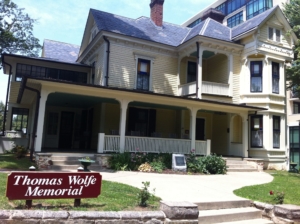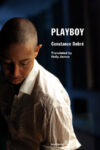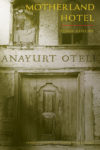 Looking Author’s Homeward: A Conversation with Tom Muir of the Thomas Wolfe Memorial in Asheville, NC
Looking Author’s Homeward: A Conversation with Tom Muir of the Thomas Wolfe Memorial in Asheville, NC
You Can’t Go Home Again, at least according to the title of one of Thomas Wolfe’s most critically acclaimed novels, but you can go to the Thomas Wolfe home again. I am living proof of this fact. I first visited the house (located in the heart of Asheville, North Carolina) in 2006, but unfortunately, due to a lack of proper planning and a miscalculation of mileage, my friend and I arrived at the Thomas Wolfe Memorial after it had already closed. We snuck around the premises in the dark like a couple of potential vandals, but we obviously missed out on most of what the museum has to offer since we never went inside or met a tour guide. When I returned all these years later, I made sure I planned my visit to get a proper tour of the property.
The tour was insightful, the guide was funny, and the stories about the “Old Kentucky Home” dovetailed with my remembrances of the “Dixieland” boarding house depicted in Look Homeward, Angel. Because Thomas Wolfe’s texts, like those of Marcel Proust, are so obsessed with the concept of memory and the persistence of the past, the importance of looking homeward becomes all the more obvious. “Each of us,” Wolfe wrote, “is all the sums he has not counted.” Yet by going back to the place where it all begins for a writer, by visiting both home and hometown, we begin to count the sums, and suddenly the writer’s works begin to dance anew for us in ways heretofore unseen.
Thomas Wolfe’s editor Maxwell Perkins wrote, “I think no one could understand Thomas Wolfe who had not seen or properly imagined the place he was born and grew up.” As a boy, imprisoned by his age in Asheville and its surrounding mountains, Perkins pictured the adolescent Wolfe thinking “that what was beyond was all wonderful — different from what it was where there was not enough of anything for him.” Even after he left, those mountains continued to encircle the writer’s imagination. One Wolfe character in an early play, Richard Weaver, says of the mountains: “They hem you in and hold you and never let you go.” This city and its surroundings never did quite let Wolfe go; he was always looking homeward while simultaneously admitting that you can’t go home again. I spoke with Tom Muir, the Thomas Wolfe Memorial’s site manager, about Wolfe and his complicated relationship with Asheville in continuing my exploration of authors and their homes and museums.
Tyler Malone: Tell me a bit about the history of Thomas Wolfe in Asheville and specifically the history of this house.
Tom Muir: Thomas Wolfe was born October 3rd, 1900, in Asheville at his father’s house at 92 Woodfin Street. The house called the “Old Kentucky Home,” located at 48 Spruce Street, just two blocks from the family home, was immortalized in Wolfe’s first book Look Homeward, Angel as “Dixieland.” It was originally built in 1883 by a local banker and was a fine Queen Anne style single family dwelling containing seven rooms. By 1890, eleven more rooms had been tacked on, and it had begun to serve as a boardinghouse. Thomas Wolfe’s family purchased the house in August 1906 and added another eleven rooms in 1916. Thomas’s mother, Julia E. Wolfe, served as the proprietress until her death in 1945. Thomas Wolfe became associated with the house just before he turned seven years old. Wolfe writes that he had “gained another roof and lost forever the tumultuous, unhappy, warm centre of his home.” He left for college at age 15, but returned for many visits. His last visit to the home was in 1937.
How did the property transition from private home to house museum?
In 1949, with several initiatives underway in the City of Asheville to recognize Wolfe, the surviving members of the Wolfe Family sold the home to a committee created by the Board of Trade and work began to make the house into a memorial to Thomas Wolfe. The title to the house passed to the City of Asheville in the 1950s. It then became a National Landmark and was added to North Carolina’s Division of State Historic Sites in 1974. Today the house interior is much like Wolfe would have remembered it in his youth.
Though it is called “Dixieland” in Wolfe’s Look Homeward, Angel, as you mentioned, the boarding house’s actual name was the “Old Kentucky Home.” Since it is located in North Carolina and not Kentucky, how did it acquire this name?
A native of Kentucky, Reverend Thomas Myers, purchased the house in 1900 and gave it the name in honor of his home state. He sold the house to Julia Wolfe for $6,500. Wolfe wrote that, for Reverend Myers, “the sheltering walls of Dixieland inspired him with horror — he felt that the malign influence of the house had governed his own disintegration.” There were nineteen boarders already in the house, and Julia agreed to keep the name of the Old Kentucky Home the same in order to keep the established clientele. The name would have served as an address for its residents and a marketing tool for future business. Julia Wolfe had a natural instinct for business.
How does the concept of “memory” play a role in Wolfe’s work and how might your keeping a place where his memories are stored help us in an understanding of his novels through that context?
Thomas Wolfe inherited his mother’s amazing ability to recall details of past events, complete with sights, smells, and sounds. As Wolfe writes from his experiences, his memory serves as a vital creative tool. He wrote that his first book was an effort to forget and move past the painful experiences of youth. Wolfe has been described as a “myth maker.” By using his mother as a character and the Old Kentucky Home as a setting in his writings, and later with that house becoming a memorial to the author, an incredibly powerful experience was created for our visitors. For first time visitors, whether they have read Wolfe’s work, or become inspired by their visit to begin reading his work, an unforgettable appreciation and understanding of Wolfe instantly occurs. The lights come on. It is an experience you will not soon forget.
We know a lot of Thomas Wolfe’s thoughts of Asheville through reading his work, but what was the reaction of Asheville to Wolfe then and now?
In October 1929, no doubt there was some shock and anger created by Wolfe’s portrayal of Asheville as Altamont, home to his character Eugene Gant. His family and friends became a curiosity. And as Wolfe’s celebrity grew in the 1930s, so did the public’s interest in Asheville. By the 1940s, he was embraced by the city as a source of pride and a tool for tourism. For many years the Thomas Wolfe Memorial was one of the few attractions in the city. A revitalization of the downtown has changed some of the emphasis for tourism away from our history and literature, yet there is still great support for the memorial in this community and the historic site continues to rank amongst the top things to do and see for our visitors.
What are some of the items that you have here at the museum that you find the most interesting?
In addition to the historic house, the Thomas Wolfe Memorial has a welcoming visitor center with audio visual program, special events, and a good exhibit gallery. One of the features of the exhibit gallery I enjoy seeing the most contains objects from Thomas Wolfe’s father’s monument shop. He was a stone cutter who Wolfe describes as a frustrated artist. In Look Homeward, Angel, his father, W. O. Gant, is certainly one of the most powerful characters and one many of our visitors find fascinating. I hesitantly admit that I identify with the frustrated artist and his tools.
How did you become the site manager of the Thomas Wolfe Memorial?
I started my career in the early 1980s as a park ranger and historian, and have always been enthusiastic about sharing cultural resources first hand on a guided tour with visitors. I have been fortunate enough to make a career as a public historian and steward for historic places. I started work at Wolfe Memorial two years ago in an effort to return to my favorite kind of work, on the frontline, sharing stories with visitors to the site. Who said “You can’t go home again?” After ten months on the job I became Historic Site Manager. While the work now often takes me back to administrative duties, it is a small site with a small staff and ample opportunities to share in giving our visitors a personal experience.
What is your favorite work by Wolfe? And who are some of your favorite writers besides Wolfe?
When Wolfe writes about his home, his family, and his friends, I enjoy his writing the most. Certainly Look Homeward, Angel would be my favorite place to start. Then it would have to be the first three chapters of Web and the Root. I recently finished Gap Creek by Robert Morgan, A Short Time to Stay Here by Terry Roberts, and A Land More Kind Than Home by Wiley Cash. At least for the moment, I am enjoying learning about and experiencing the work of the writers of Western North Carolina who were influenced by Thomas Wolfe.
Unlike some other modernists, like say Hemingway or Faulkner, Thomas Wolfe isn’t as widely read today. Why do you think that is and what do you think can be done to revive Wolfe in the public consciousness?
Because of Wolfe’s untimely death at age 37, and changes in the publishing industry, he has faded from view more quickly than some of his other contemporaries. We are excited to be reading about a film by Michael Grandage Productions, Genius, which will focus on Thomas Wolfe’s editor Maxwell Perkins. Thomas Wolfe’s story will play an important part in the film. With the big bad Wolfe on the big screen, we hope there will be new enthusiasm for his work and greater support for the preservation of his memorial in Asheville. His stories have inspired many new writers and, as long as his work stays in print, it will continue to do so.
In the upcoming 2015 film Genius that you mention, Jude Law will portray Thomas Wolfe. As someone who has obviously spent a lot of time with Wolfe’s texts and his environment, I’m curious what you think of this casting?
We think Jude Law is a great choice to portray Thomas Wolfe. He spent a couple of days with us last June. He came well prepared, having read Look Homeward, Angel, and sincerely wanted to learn everything he could about Wolfe’s life in Asheville. We had a great visit. Besides obviously being dedicated to his art, he was friendly and generous with his time with all the people he met. People who knew Thomas Wolfe described him in a similar way.
Faulkner once claimed that he admired Wolfe for trying “to do the greatest of the impossible . . . to reduce all human experience to literature.” (Of course, he would later go on, in less kind words, to describe Wolfe’s writing as “an elephant trying to do the hoochie-coochie.”) But I’m curious if you agree with Faulkner that Wolfe’s project seems to be to reduce all human experience to literature?
Wolfe’s intent was to writing some six volumes, an epic work describing the American experience from Colonial times to the 1930s. In the work he did create that was published, many individuals find a personal connection to their own experiences. But the “human experience” that Faulkner suggests in Wolfe’s writing are the experiences of Thomas Wolfe who, in spite of the burden of genius, was just another human being that many people can identify with.
In his New York Times obituary, the paper claimed of Wolfe: “The stamp of genius was upon him, though it was an undisciplined and unpredictable genius.” Is that a fair description of his genius? Was it undisciplined and unpredictable?
Wolfe was actually a very disciplined writer, worked hard, and was dedicated to the craft. He admitted in A Story of a Novel (1936) that he “. . . was just a writer who is on the way to learning his profession and to discovering the line, the structure, and the articulation of the language.” Perhaps those who knew his work prior to his death would state that his writing style and his subject matter, based upon his personal experience, was predictable. The pressure of meeting the expectations, his own and from others, of “genius” created personal stress that no doubt was a factor in his early death. A few observers also suggested the task of attempting to control Wolfe’s genius also led to the end of his editor Max Perkins.
A number of years ago the original text of what became Look Homeward, Angel, titled O Lost, was reconstructed and published. There are camps who stand by the more well-known Perkins-edited edition, Look Homeward, Angel, and camps who now claim the original O Lost is the true masterpiece. What say you?
Perkins’s genius was in helping his authors create a novel that the reading public would embrace and that the publisher could market and profit from. He definitely helped Wolfe complete a better book and launched him into history. Reading O Lost, which is sadly now out of print, you will find that Wolfe could write a masterpiece without the help of Perkins. Perkins may have been correct that the general public of 1929 was not ready for the passages in the book some might consider obscene. However, you do have to wonder, with changes in readers’ tastes today and changes in the publishing industry in general, if Wolfe was just now a first time novelist how O Lost might sell in the 21st century.
I’ve always wondered if you ever have people arriving at the museum thinking it is museum for Tom Wolfe of Bonfire of the Vanities fame?
We have had a few folks get to the end of our 50-minute tour of the old boardinghouse before they realize we are not talking about the guy in the white suit. As a tour guide it is rewarding for us anytime we see the light bulb going on and someone finally making connections and coming to a basic understanding and appreciation of our work, but you do have to wonder where they were over the last 45 minutes.
For a visitor who loves Thomas Wolfe — and knows they love Thomas, and not Tom, Wolfe — are there any other locations in Asheville and its environs mentioned in Wolfe’s work that one can visit or see?
Wolfe writes often about his home, his family, and his sense of place from the memories of his home, whether it is Asheville, Cambridge, London, Paris, or Brooklyn. For the students of Thomas Wolfe’s writings, there are places that remain that Wolfe would have known during his lifetime in Asheville. At the Thomas Wolfe Memorial, we are currently putting together a walking tour of the downtown area that would help people connect the places found in Wolfe’s fiction with what you see today.
Lastly, for visitors thinking of coming to visit, what other points of interest, not necessarily related to Wolfe, would you recommend in and around Asheville?
If you want to get a general picture of the places to go in and around Asheville, jump on the Gray Line trolleys. Give yourself plenty of time to jump off, visit the beautiful churches in the downtown, see the architecture of the commercial area, walk the Urban Trail, explore the River Arts District, and check out Riverside Cemetery where Thomas Wolfe is finally at rest.
Tyler Malone is a writer, teacher, and traveler. His work has appeared in The Huffington Post, The Millions, Full Stop, PMc Magazine, The Tottenville Review, and Literary Traveler. He was once known as “the Reading Markson Reading guy.”
This post may contain affiliate links.







